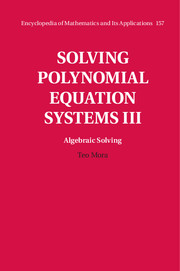42 - Lazard II
from PART SIX - Algebraic Solving
Published online by Cambridge University Press: 05 August 2015
Summary
The introduction of the Gröbner basis to the computer algebra community activated a new interest in some older bases, such as Macaulay's basis (Sections 23.5 and 23.6) and the related algorithms (see Chapter 30), Hironaka's standard bases (Sections 24.5–24.8) and Ritt's characteristic sets.
Ritt's results (dated 1932), strongly influenced by Noether's results on the Decomposition Theorem (Sections 27.3, 27.4 and 32.3) were intended to give an algebraic standpoint to differential equations but, as was already usual for Riquier's followers (Delassus, Janet, Gunther), Ritt translated his results into the algebraic variety setting. In this setting he gave an effective decomposition algorithm, which, through the further application of univariate factorization, returned an irredundant prime decomposition of a radical ideal.
As the computer algebra community became aware of Buchberger's result, in China Wu Wen–Tsün was applying a weaker (but for his aims sufficient) version of Ritt's algorithm as a tool toward a “mechanization” of theorem-proving in elementary geometry; Wu's version of Ritt's result omits the hard and useless (for his aims) factorization step, thus returning a decomposition of a radical ideal into unmixed ideals.
In the early 1990s, within the PoSSo frame, Lazard, a strong expander and developer of the Kronecker–Duval Philosophy, reformulated Ritt's solver. He avoided the required factorization by means of Duval splitting via his Theorem 11.3.2, thus producing a decomposition into radical unmixed ideals, each defined via a triangular set, that is, what I called (in Definition 11.4.1) an admissible Duval sequence.
Later, Möller proposed an algorithm which applies only to zero-dimensional ideals, decomposing them into ideals presented through a triangular set; the theory is based on ideas related to the Gianni–Kalkbrener Theorem 39.3.1 and the algorithm is an adaptation of Traverso's Algorithm 29.3.8.
- Type
- Chapter
- Information
- Solving Polynomial Equation Systems III , pp. 138 - 191Publisher: Cambridge University PressPrint publication year: 2015



